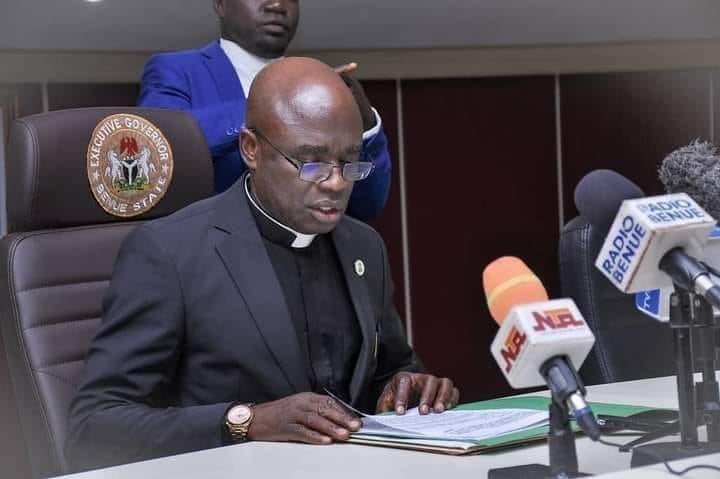BY BEM ASEN
A letter to Hyacinth Alia, governor of Benue state
Your Excellency Sir,
Congratulations on your new mandate. Like many other citizens of Benue state, I am excited about what this mandate hopes to offer. Doubtless, you have resumed office at a difficult time — agricultural productivity has dwindled (resulting in extreme hunger and poverty due to the farmer-herder crisis); the pension and gratuity deficit is huge, the state’s debt profile has shot the ceiling with no commensurate projects or payback strategy in place and the civil service – as you yourself had noted – is dilapidated.
Advertisement
Furthermore, there is huge youth unemployment and the health and education sectors are in terrible shape—yet the people’s expectations remain high.
The situation of the state as I have described is my main motivation for writing this letter. It aims at supporting the government with ideas targeted at initiating intellectual debates around our problems and proffering workable sustainable solutions. I do not consider these ideas silver bullets at the humongous governance issues of the day. But I offer them as a starting point for continued debate targeted at achieving our collective aspirations of a better society.
Transparency, accountability and feedback mechanisms
Advertisement
I am convinced that anyone who runs a multi-billion-naira company will eagerly pay for a service that promises to provide them pieces of information capable of improving their fortunes— say doubling or tripling their company’s net wealth. And while the endeavour in front of you is not a company, I believe the rules of success in the position of governor will necessarily be similar. Therefore, to be successful in leading Benue, I encourage you to be open-minded at taking feedback from the people you lead.
Honest feedback from the people is the only gateway to understanding the shortfalls of your programmes. So, listen to people. In today’s world of social media, feedback abounds. As the purposeful leader that I know you would want to be, I encourage you to take things a bit further by creating various social media accounts, apart from your personal and government accounts, that would allow people to send your government feedback. The use of social media to harvest these golden voices should be accompanied by your total immersion in grassroots communities for feedback— the kindness of a leader is known by how keenly they pay attention to the needs of the deprived. This will allow you to interact with the people at every stratum of the society which your now politically insulated position might not allow you to.
In its best form, government in a democratic dispensation is participatory requiring inputs from both the supply, that is the government side, and the demand, the people’s side. Make it clear to everyone that criticism is welcomed and caution your lieutenants not to attack people when they help the government by constructively criticising it.
Your government must embrace transparency and accountability which I believe is the difference between a sincere and an insincere institution. In the time past, the citizens were not allowed access to information about the size of the IGR, how the FAAC is utilised, the number of people in government payrolls and the like. As a justice leader, you must be different. I urge you to raise the bar of transparency by beginning the publishing of monthly IGR, and FAAC and how it is been utilised. This should also include other financial inflows and outflows of the government.
Advertisement
This will not just help you in running a transformative government but will also provide the citizens with a robust mechanism to help you do so. Your mantra of delivering Benue state from poverty is only achievable when there is transparency in governance structures and processes and when citizens can exercise their civic responsibilities of holding the government accountable.
Civil service reform and meritorious recruitment as the surest way to drive sustainable change
Until recently, I did not quite appreciate the role of civil service in nation-building (maybe because the system has not received the attention it requires over the years). Now, as you also know, the system has been bastardised but the health of every government depends on the brilliance of its civil service. As governor, I urge you to make the reforms in the service that prioritises meritorious employment; improve the welfare and capacity development of workers; digitise governance and clamp down on corruption.
Having a high-performing civil service is a major road toward a working society. The NHS in the UK is among the highest employers of labour in the world. In China, 80% of companies on the stock exchange are state-owned. The world’s largest company by profit, ARAMCO—Saudi Arabia’s equivalent of our NNPC, is state-owned. All these institutions are run by the government directly by competent and competently recruited citizens. This indicates that government can equally participate in birthing the economic society that we all would be proud of if the civil service is transformed. The Benue state civil service when transformed can give similar results. We are nothing without state capacity and strong institutions. We can not have state capacity without people of capacity working for the government. Our time starts now.
Advertisement
Investment in the youth
Without huge investments in the youth, our efforts at providing prosperity for our people will be one in futility because youths are the leaders of tomorrow and they can not be great tomorrow if future leaders are not equipped with the competitive skills required to tap into global markets. However, with painstaking investment in Benue youth, we can lead our people to prosperity and end generations of poverty. This is the practice for all nations that have transformed their people from time immemorial.
Advertisement
That the Indians dominate the technology industry globally and have exponentially increased their GDP is a testament to how well they have, over time, invested in the most productive portion of their population— the youth. Currently, an Indian educated in India is the president of the World Bank (he was formerly CEO of Mastercard). Both CEOs of Alphabet (parent company of Google) and Microsoft are Indians, educated in India. The Indian tech market, dominated by youthful ingenuity, exports $150 billion worth of software annually. The list is endless; it goes to demonstrate what is possible with intentional investment in the future generation.
Now, two ideas immediately come to mind.
Advertisement
The government should begin a project in partnership with the private sector that will intensely build the capacity of youths in tech skills (software development; cyber security; graphics; product management; digital marketing; data analysis etc). There exists a huge market for people with these skills in the tens of millions globally. Irrespective of skin colour, height and location, youths that possess these skills are highly sort after and those from Benue state will immediately take up those positions when trained.
The government can have a programme that trains 5,000 youths annually and with partnerships and support onboard them to the global workforce. This project will directly lift 20,000 youth off the streets of poverty in four years if well implemented. I am cautious to overestimate the indirect impact of such a project, but I believe it might be in the tens of thousands given the multiplier effect of having a thriving tech ecosystem— one like that in Yaba, Lagos, and Silicon Valley, California.
Advertisement
Government should float an investment fund to the tune of about N500 million or more per annum with the aim of training and investing in youth businesses. With investments ranging from N300,000- N1,000,000, the government can invest in over 1,000 businesses either as loans, grants, equity, or a combination of any of the models. The future of the Benue economy is in the size of revenues made from small businesses so investing in the businesses owned by youth, even though risky, presents hope for a better economic future.
Investing in the businesses of the youths is a proven strategy globally for opening new markets and job creation in the developed West. For instance, When Google was just a start-up, it received a million dollars in funding from the US government. Today, the company employs a few hundred thousand globally and generates tens of billions (USD) in revenue and continues to make life easy for billions of people across the globe. With the right investment, this can be our story here in Benue state.
Agricultural investment in the face of climate change
As the food basket of the nation, we have fallen short of the demand on us— which is to feed Nigeria. My belief is that our failure is more of a strategic failure than a lack of participation or interest in the craft. We have played the subsistence game for far too long. Now, it is time to live up to expectations.
Data shows that agriculture is not a big employer of labour as much as it is a wealth-creation profession, thus the quote “farmers are rich people”. The Dutch’s agricultural export stands at $79 billion yet the sector only direct employs 2.2% of their total population (a country of 17.5 million people), which is down from 4% in 1991. The US’s agricultural export is about $118 billion yet only 10% of its population (which is 21.1 million people) are directly or indirectly employed by the sector. In Nigeria, the difference is clear, almost everyone is farming yet we have never made up to $5 billion in a single year from farm exports. Agriculture that takes everyone to the farm is a waste of time. Now it is time to go mechanical, technological and scientific.
Going forward, our agricultural focus must tend towards wealth creation. It is a sad reality that maize is imported into this nation, a crop that can be grown in millions of tons between Guma and Gwer West LGAs alone. More focus must be given to exportable crops since we are not producing at scale any of the crops that dominated Nigeria’s agricultural export in the first quarter of 2023— cashew nuts, sesame, palm oil, ginger, cocoa and soybeans. This is not the way to go. Through government and private partners, agricultural processing centres must be revived and built.
Climate change remains one of the biggest challenges of agriculture. It is tipped by the UN to cause poverty for a hundred million people in Africa if adaptation practices are not mainstreamed. The cost of inaction on climate adaptation in the agricultural space has been empirically shown to outweigh the cost of action. This calls for the government’s improved funding in the development and adoption of climate-smart agriculture. I propose a fund for research and mainstreaming of climate-smart agriculture practices. The same fund can be deployed as grants and loans to young people to start agricultural enterprises that can become giant companies of Benue origin tomorrow.
The kind of agriculture that will benefit the Benue state economy is one that creates enterprises while also putting food on our tables. For instance, if government policies can create 1,000 new farming enterprises yearly that can generate a PAYE of N500,000 monthly, then that would amount to N6 billion yearly in IGR from just agriculture. It is doable. They are many brilliant youths in the state who if provided the training and investment can pull this feat.
Besides the market and technical aspects of agriculture, ensuring that peace and tranquillity return to the communities and people ravaged by the herder-farmer crisis in the state will be the singular most important action in reviving the agricultural industry in Benue.
I appreciate that you captured this in your manifesto during the campaigns and at this point, an acceleration of government machinery towards providing lasting peace in these communities is of high essence.
Education, health, and research
The place of massive investment in the trio of education, health, and research as an indispensable prerequisite for the multidimensional development of any organised entity of human endeavour is a sealed fact. In 2021, China invested over 80% of Nigeria’s current GDP in research and development (R &D) alone. It is thus not surprising that their export revenue for 2022 stands at $3.6 trillion ahead of the United States at $2.1 trillion— a prosperous society is only possible with huge investment in R & D.
In the case of Benue state, a low-hanging fruit would be the restructuring of our annual capital allocation so that the trio (education, health, and research) receives the highest funding and attention from the government. Benue state has many brilliant young graduates working across Nigeria, many with Bachelors, Masters, and PhDs and if the primary and secondary education is well-funded and offers economically reasonable wages, I believe many will return home to bless the kids in these schools with their huge experiences as teachers. I know many people with masters and PhD living in Abuja and Makurdi who would return to Ajio Shangev Ya or Ihugh to teach in a primary or secondary school if you pay them N100,000. It takes just a single generation to create a revolution and maybe ensuring that all the kids that go to school during your time as governor get world-class education might just be our own launch pad for greatness.
Our university system is not left out. In a recent experience, while supervising the just completed JAMB exams, it was surprising to note that many of the students chose universities other than Benue State University (BSU) even though these were kids from Benue state. The reason is simple, they are not sure of getting an admission spot at BSU. In my undergraduate days, many students who went to Ghana and other places for university education did so because they could not secure admission at home but we can change this.
We can expand BSU’s capacity to take upwards of 60,000 students yearly or upgrade COE Katsina, Oju etc to universities. I am told BSU and the University of Agriculture Makurdi are in the top five highest generators of IGR for the Benue state, thus besides the institution’s function as a citadel of learning, enrolling nearly 100,000 students yearly as university students yearly will increase access to education for many, create the much-needed jobs and generate revenue for the government.
Research is at the epicentre of modern civilisation and advancements without which there can be no progress in life, unfortunately, our institutions do not give it the desired attention. As I write this, I stumbled on an article about a Chinese factory worker whose left hand was severed during an accident at work and doctors were able to graft the hand on his ankle which was later transplanted back to the arm after a considerable number of weeks. In many climes, limbs or body parts severed during accidents can be affixed if the affected person is within the reach of a medical facility within a few hours. Such a feat is almost unthinkable within our clime, thanks to poor research protocol at our schools.
BSU medical school is long overdue for a yearly research endowment. Benue state is home to some of the worst disease incidences: onchocerciasis is ravaging many parts of Ushongo, Kwande, Katsina-Ala, Buruku and Zone C; bilharziasis is still a huge public health problem in Benue state; malaria still kills pregnant women and little children. The reality is that if we truly desire to see an end to these problems, we are the ones to rise up. With government support, our institutions can develop 21st-century-level research capacity that can innovate us out of these problems. It does not make sense that as a major belt of river-blindness hyper endemicity in the world, we do not have a single research group or lab working on the cure of the disease even at BSU Medical School. I believe we can fix this by funding research at undergraduate and PG levels for programmes in medical and biological sciences, targeting our major public health diseases.
At the peak of the Covid pandemic when staying alive was all that mattered, biomedical research skills became the new oil. While we do not pray for another pandemic, our biggest act of faith at this point will be the positioning of our schools such that students develop biomedical research skill sets required to defeat another pandemic should the need arise. If we decide to train just a thousand students of medicine and biology yearly in the most advanced and globally demanded biomedical research capabilities, we will be setting up Benue state for a biomedical revolution. Many of these kids trained will attract jobs within and outside Nigeria, gain scholarships, get into academia, and set up research organisations that will attract funding for local research into our most deadly human diseases.
Without taking such a bold step as described above we might take just too long a time to succeed as a people or might never succeed at all. At the moment, too many students are funding their research both at postgraduate and undergraduate levels that we often miss the opportunity of capturing useful data and value for our collective advancement. Recently, I was speaking with an undergraduate Zoology researcher studying wall geckos, while the prospect sounded interesting, the scope of the study was limited to discovering the animal’s habitats. A more ambitious approach would have been the dissection of the animal, identification of pathogens and carrying out phylogenetically classification of the organisms there using molecular biology techniques. Such a study will provide insights into zoonotic disease research and since the lethal nature of wall geckos is a thing of contestation, it might help throw out some light.
Waste management
Waste they say is wealth. However, in Benue state, we have over the years failed totally in tapping into this 21st-century source of job creation and revenue creation. The heaps of indiscriminately dumped waste all over the state continue to put us in a shameful position. But this can change. I believe the waste management industry in Makurdi alone can generate 6,000+ jobs and over a hundred tax-paying enterprises.
My immediate thought is that government can revolutionise this industry by passing legislation that privatises/commercialises it, beginning first by putting BENSESSA in its original role as the regulator. That is the practice globally. Other provisions of the law could be to mandate that all house owners make provision for waste disposal systems depending on the nature of waste; criminalise indiscriminate dumping of waste; empower the new BENSESSA to grant licences to enterprises that will remove waste from homes and businesses premises at a fee to dumpsites; empower government/private sector to build mega waste management facilities at the final point of collection; enable the government to build reward-based recycling centres for all recyclables including plastics and metal—it should be possible to gather plastic containers and exchange for money immediately.
My proposal here is very basic but I believe on a round table more transformative ideas can originate with the principal aim of decimating wastes on our streets, creating jobs and revenue for the government of Benue state.
Sovereign fund for saving and investment
I believe Benue is mature enough to have a well-managed fund to invest for her future generations. Your government can start a fund that invests in local and international businesses with growth and high-impact prospects. If we start a well-managed fund backed by legislation today no matter how small, it will be of extreme use tomorrow.
In 2004, at the rate of $500,000 in exchange for 10% of Facebook, Peter Thiel invested in the company, and that initial amount became $2 billion during Facebook’s initial public offer in 2012. My personal bias though is in the fintech industry. Nigeria’s own Kuda Bank at just four years of existence is worth $500 million, an investment of $100,000 two or three years ago would have returned $7.5 million today.
Similarly, Nigeria’s Flutterwave is worth $3 billion and is still under eight years of existence. Benue state would benefit hugely from this financially rewarding technological revolution if the government sets up a competent vehicle that does due diligence and invests early in these companies. The Saudi’s Public Investment Fund for the same purpose is worth $700 billion but we can start with as small as a few million dollars and grow with it.
We must prepare for population ageing
The UN believes that population ageing would be one of the most disruptive changes of the 21st century with the population of older people expected to rise to 1.5 billion by 2050. The youngest continent, Africa, will not be left out in the myriad of challenges that accompany old age—the increased cost of healthcare, reduced incomes due to retirement, economic burden of pensions and retirement benefits, disability and frailty. As a society, we must begin to prepare for this. Already we are doing poorly with pensions which is the basic level of social protection for those in later life. If we do not step-up investment and intentionality of our policies in this regard, the future will overwhelm us.
Payment of pensions and gratuities should not be bargainable. Thankfully, you have begun to do so. But it must continue to be government’s top priority throughout your time as governor. Also important is the prompt remittance of funds in the retirement savings accounts of current workers to guarantee their financial future when they retire.
Government can develop an arm that focuses on making and updating age-friendly laws anchored around boosting cohesive intergenerational relationships, halting elder abuse, fighting multidimensional elder poverty, instituting a universal, non-contributory pension for older adults etc.
Based on my experience as a Commonwealth fellow and researcher at the University of Southampton for a Masters in Global Ageing and Policy, I am deeply worried and best in the position to say that most of our gains as a civilisation might be wiped out if we do not begin now to prepare for the next generation of older people. Nigeria’s median age is 17 years, this means that in the next 40 years at least 70% of the population will be 60 years and above, that is some 110 million people at the very least. The number of people taking pensions today in Benue state might be a little more or less than 20,000 people but with the population fast ageing that might be upwards of 200,000 people. The best time to have acted was years ago but today presents an even better opportunity to begin stronger and wiser.
In conclusion, the journey of delivering a more equitable and prosperous Benue state is not an easy one—the issues are many, profound and existential—and no sane person should think it is going to be a walk in the park. Yet with the right mindset, policy implementation, team and with God by our side, this precarious situation presents us an opportunity to become a shining light to the rest of Nigeria. I believe you have what it takes to change the game and deliver a prosperous Benue. We are praying and rooting for you. May God Bless you. God bless Benue State and the People of Benue.
Asen (PhD) writes from Makurdi, Benue state. He can be reached via [email protected] or +2348068366715. He tweets @bemasen
Views expressed by contributors are strictly personal and not of TheCable.






